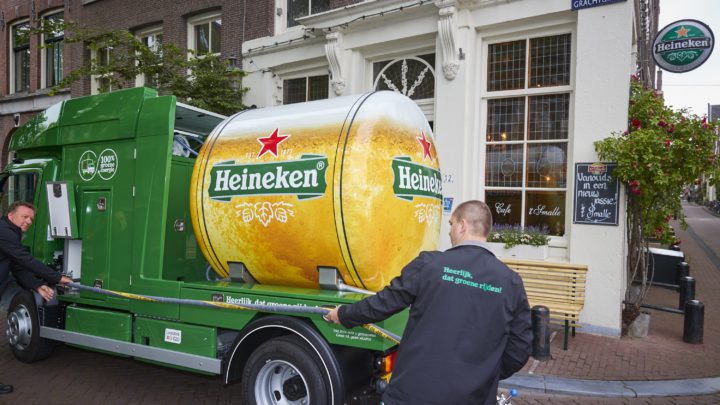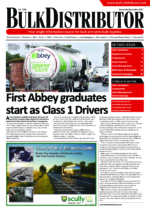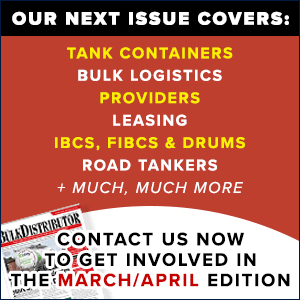
Now, the company is delivering bulk beer to cafes in the historic heart of Amsterdam with what it claims is the world’s first electrically powered mini-tank beer truck.
“Heineken has strong green ambitions. We look at the entire value chain, and of course, this also applies to clean transport. I am pleased that we can now sustainably transport large volumes such as tanked beer,” said general manager Hans Böhm.
It is not just about reducing emissions and soot particles, noise pollution is also significantly reduced because the new electric truck is extremely quiet.
“This new mode of transport improves the quality of life for everyone who lives, works or visits the city centre. An additional advantage is that thanks to this leap forward you can enjoy a beer even better on, for example, a terrace. I’d rather hear smiling people and beautiful music than a roaring engine that also stinks and suffocates,” Böhm added.
Innovative logistics solution
What makes Heineken’s move even more interesting in that it is driven – metaphorically and literally – by an innovative logistics solution. The truck was developed in collaboration between Heineken Netherlands, Abrex Logistics and Duotank, a producer of tank-beer systems used in the hospitality industry, stadiums, concert halls, and public events.
Duotank uses a ‘Bag-In-Tank’ liner system as an environmentally-friendly solution for draft beer. The beer is kept under pressure in the tank with compressed air instead of CO2, and because it is in an airtight bag, the compressed air cannot reach the beer.
The system works with a fully recyclable bag so that the tank does not have to be cleaned before each filling with chemical cleaning agents. In so doing, Duotank claims this saves 0.5kg CO2 per hectolitre of beer that is tapped compared with an equivalent amount of traditional keg beer. Moreover, the quality of the beer is also preserved for longer, Duotank maintains.
As part of the sustainability programme, Duotank has developed a recycling channel for the liners. This helps breweries not only become more sustainable it could help them avoid potential extra taxes on plastic waste.
Currently, liners are collected as part of common plastic waste. This waste is not recycled, as many believe, but incinerated because the different types of plastic in this waste cannot be separated.
Affordable collection system
To be able to recycle plastic users need to know exactly what composition the plastic has and what kind of contamination it can cause. Duotank solved this issue by forming an alliance with a group of recycling companies and setting up an affordable collection system.
The liners are collected at the brewery. A press forms the plastic waste into blocks with an economic size and weight. These blocks can then be collected regionally, which makes transport affordable. Based on purchase volumes of different liner types Duotank determines the plastic and residual waste composition and forwards this to the recycler.
Dependent on the composition the recycling company combines different batches of liners (from other industries, as well) and forwards these to a number of selected recycling factories in Europe. Then, knowing the exact composition of the supplied plastics the recycling factory can then turn the waste into usable plastic granulate, the base material to produce new plastic products.
Reusable plastic granulates
The recycling company issues a certificate stating that the batch of delivered liners has been converted into reusable plastic granulates. In this way Duotank and its partners say they have made it possible to recycle liners completely and affordably.
Heineken’s tank beer truck is smaller than a previous iteration and is therefore much more manoeuvrable. In 2020 it was announced that all Heineken beer for the Dutch market would aim for ‘green’ status, and logistics is an integral part of that ambition.
But, while electric vehicles are quite common in passenger transport, sufficient pulling power in goods transport remains challenging.
Significant load weights often have to be divided between several vehicles and journeys for the time being. That also applies to Heineken; from the company’s brewery in Den Bosch, a large truck transports 200 hectolitres of fresh beer to the outskirts of Amsterdam. There, 30 hectolitres are transhipped to the smaller, electric truck, enough to supply approximately five cafes with beer. Once empty, the truck refuels on the edge of the city with both electricity and beer to continue on its way to the historic heart of the Dutch capital.
Brewing a better world
The new trucks are considerably lighter than their predecessors and meet the standard of up to 7.5 tons to protect quays and bridges. In this first phase, two electric tank beer trucks are operating in Amsterdam and Heineken intends to make its vehicle fleet for urban distribution even cleaner and quieter in the coming years.
Supplying tank beer in this way is part of Heineken’s ‘Brew a Better World’ approach in which growth and sustainability go hand in hand.
This article is from the November/December issue of Bulk Distributor magazine. To receive a digital copy of the magazine as well as our monthly newsletter, sign up here.

